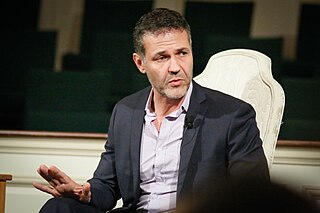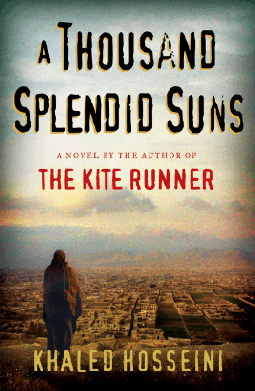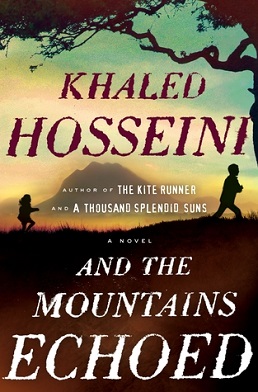Conception
Sheila Silver became passionate about Khaled Hosseini's 2007 novel in 2009, listening to the book-on-tape narrated by Atossa Leoni. In 2012, after several letters and exchanges, Khaled Hosseini gave her his enthusiastic support and the rights to adapt the novel for the operatic stage. Charles Jarden, General Director of American Opera Projects, who had worked with Silver on the development of Beauty Intolerable, A Songbook based on the poetry of Edna St. Vincent Millay [2] and had sponsored the New York City premiere screening of the film of her opera The Thief of Love, committed to helping develop the project. [3] Stephen Kitsakos, who wrote librettos for Silver's operas The Wooden Sword [4] (winner of the Sackler Prize in Music in 2007) and The White Rooster (commissioned by the Smithsonian's Freer Sackler Gallery) helped transform the novel into opera.
“I didn’t feel that my eastern European Jewish roots would carry me far enough into Afghanistan,” Sheila Silver told Opera America. [5] Silver undertook a study of Hindustani music, the foundation of Afghan classical music. At first Silver studied Hindustani music long-distance with her mentor, acclaimed Hindustani musicologist Deepak Raja. Then she went to Pune in northern India to study for six months with Pandit Narayanrao Bodas and Pandit Kedar Bodas. Her ambition was to discover “how to create an authentic Afghan color (Afghan music is based on North Indian music) in my Western voice. ... I will include tabla and bansuri (bamboo Indian flute) in my otherwise Western orchestra.” [6] Silver dedicated her opera's score to “Pandit Kedar Narayan Bodas, who invited me into the inner sanctum of his Hindustani musical family and taught me with patience and love, inspiring the sound world for A Thousand Splendid Suns.” [7]
The world premiere production was conducted by Indian-American maestro Viswa Subbaraman, who grew up listening to the Carnatic music of southern India. [8] Renowned percussionist Deep Singh, who at the age of seven became the youngest disciple of Ustad Allah Rakha (father and teacher of Zakhir Hussain) played tabla. American bansuri master Steve Gorn played bansuri.
The world premiere production is to be directed by Roya Sadat, who was named one of the BBC's 100 Women for 2021 for her trailblazing work as one of Afghanistan's first female film directors. [9] Sadat calls A Thousand Splendid Suns "a universal story of self-sacrifice, fear, love, and hope that connects every human being from each corner of the world. Unfortunately, this opera has even more meaning today, in the aftermath of the US withdrawal from Afghanistan, as this horrible history is being repeated once again for the women and girls of our land." [10]
Support for the composition and creation of A Thousand Splendid Suns has come from a 2013 Guggenheim Award, [11] a 2014 Opera America Discovery Grant for Female Composers, a NEA Development Grant (secured in partnership with American Opera Projects), and an Opera America Commissioning Grant (funded by the Virginia B. Toulmin Foundation), [12] and the Berkshire Taconic Foundation.
Workshops of A Thousand Splendid Suns, all undertaken in collaboration with American Opera Projects, involved director Leslie Swackhamer, conductor Sara Jobin, and soprano Lucy FitzGibbon as Laila. They included:
- In June 2015, 1 hour from Act I was workshopped at the National Opera Center in New York. Aidan Lang, then General Director of Seattle Opera, heard and became interested in commissioning the opera at this workshop.
- In January 2016 the complete Act 1 was workshopped in partnership with the Studios of Key West, Florida.
- Also in January 2016, 25 minutes of Act 1 was presented with full orchestra at Opera America's New Works Forum at Trinity Church in New York City.
- In November 2017, Act 2 was workshopped at the Hudson Area Library and National Opera Center in New York City.
- March 2023 at Seattle Opera.
Synopsis
Fifteen-year-old Mariam, the cast-off bastard child of a rich father, is forced to leave her rural home after her mother's suicide and marry a middle-aged shoe-maker from Kabul named Rasheed. Alone, scared and forced to wear the burqa, something unfamiliar to her, she tries her best to be a dutiful wife but is unable to conceive a child. Consequently, she lives a loveless existence with a husband who abuses her regularly for her failure to give him a son.
Years later, as competing factions of sectarian warlords secure a stranglehold on Kabul, a bomb explodes in Mariam's neighborhood killing the parents of fourteen-year-old Laila, a modern, educated, ravishing beauty. Rasheed brings the wounded girl to his home and Mariam, reluctantly, nurses her back to health. Rasheed, now a sixty-year-old man, schemes to get Laila to marry him by concocting a story that her beloved fiancée, Tariq, who was forced to flee to Pakistan a few weeks earlier with his parents, has been killed. Laila, secretly carrying Tariq's child, agrees to marry Rasheed, hoping to create a safe haven for the child.
At first Mariam is cold to Laila, but gradually the women bond over Laila's baby, a girl named Aziza, as well as their hatred of Rasheed, who abuses them physically and psychologically. Eventually the Taliban rise to power and life in Kabul becomes more oppressive. When the two wives and Aziza attempt a daring escape from the city they are caught at the Kabul central bus station, escalating Rasheed's abuse and anger. Although Laila eventually gives Rasheed the son he has always wanted, the violence continues.
The turning point comes when Tariq, Laila's beloved, returns to Kabul and finds her. Rasheed learns of Tariq's visit to the house and in an act of extreme rage begins to strangle Laila. Mariam, refusing to stand silent, saves Laila's life by hitting Rasheed on the head with a shovel, killing him.
Mariam convinces Laila to flee with Tariq and Laila's two children. She will remain behind to take responsibility for killing Rasheed, knowing that she will be sentenced to death. As Mariam walks to her execution, an understanding of her life brings her a sense of self-worth and spiritual peace: she has loved and been loved. She saved Laila's life and has lived a life of consequence. She knows that Allah will forgive her.

Pandit Pannalal Ghosh, also known as Amal Jyoti Ghosh, was an Indian flute (bansuri) player and composer. He was a disciple of Allauddin Khan, and is credited with popularizing the flute as a concert instrument in Hindustani classical music and also the "Pioneer of Indian Classical Flute".

Khaled Hosseini is an Afghan-American novelist, UNHCR goodwill ambassador, and former physician. His debut novel The Kite Runner (2003) was a critical and commercial success; the book and his subsequent novels have all been at least partially set in Afghanistan and have featured an Afghan as the protagonist. Hosseini's novels have enlightened the global audience about Afghanistan's people and culture.

The Kite Runner is the first novel by Afghan-American author Khaled Hosseini. Published in 2003 by Riverhead Books, it tells the story of Amir, a young boy from the Wazir Akbar Khan district of Kabul. The story is set against a backdrop of tumultuous events, from the fall of Afghanistan's monarchy through the Soviet invasion, the exodus of refugees to Pakistan and the United States, and the rise of the Taliban regime.
Sheila Jane Silver is an American composer.

The classical music of Afghanistan is called klasik, which includes both instrumental and vocal forms (ghazals). Many ustad, or professional musicians, are descended from Indian artists who emigrated to the royal court in Kabul in the 1860s upon the invitation of Amir Sher Ali Khan.

A Thousand Splendid Suns is a 2007 novel by Afghan-American author Khaled Hosseini, following the huge success of his bestselling 2003 debut The Kite Runner. Mariam, an illegitimate teenager from Herat, is forced to marry a shoemaker from Kabul after a family tragedy. Laila, born a generation later, lives a relatively privileged life, but her life intersects with Mariam's when a similar tragedy forces her to accept a marriage proposal from Mariam's husband.
Suphala is a tabla artist, composer, and producer. She is a protégé of tabla players Ustad Alla Rakha and Zakir Hussain and is based in New York City.

16 Days in Afghanistan is a 2007 documentary film about the journey of Afghan-American Anwar Hajher, also the director, traveling to his homeland Afghanistan after 25 years to rediscover his country. The film is produced by Mithaq Kazimi and is the first documentary since the fall of Taliban to be shot in those provinces which remain under the heavy influence of the Taliban. The film became a reference film on Afghanistan, including Penguin Books' study guides about Afghan-related books.
Atossa Leoni is an actress who has worked internationally in film, television, and theater since childhood.

Kārte Seh, is a neighborhood in western Kabul, Afghanistan, part of District 6. It is a planned and middle-class settlement and is associated with Afghanistan's Shia Hazara minority. Karte Seh is also famous for being the site of the orphanage Aziza is sent to in Khaled Hosseini's novel A Thousand Splendid Suns.
The San Francisco Writers Workshop is one of the oldest continuously running writing critique groups in the United States, meeting every Tuesday night, except for major holidays, since 1946. Successful published authors who first workshopped their books in the group include Khaled Hosseini, David Henry Sterry, Aaron Hamburger, Joe Quirk, Michelle Gagnon, Kemble Scott, Tamim Ansary, Erika Mailman, Zack Lynch, Zarina Zabrisky, and Ransom Stephens.
Debopriya Chatterjee and Suchismita Chatterjee are sisters by birth, popularly known as the "flute sisters". They are Indian Hindustani music artists who play instrumental Indian flute music.

Abdul Sattar Khan, popularly known as Ustad Tari Khan, is a Pakistani tabla player and vocalist. Tari Khan hails from the Punjab gharana and is the student of Ustad Miyan Shaukat Hussain. He has been awarded with many accolades such as Taj Poshi, the Hazrat Amir Khusrow Award, as well as Pakistan's Pride of Performance Award in 2008. Tari Khan belongs to the tabla playing gharana called the Punjab gharana. Today, he is acknowledged as one of the foremost Tabla players of all time by musicians all over the world.

And the Mountains Echoed is the third novel by Afghan-American author Khaled Hosseini. Published in 2013 by Riverhead Books, it deviates from Hosseini's style in his first two works through his choice to avoid focusing on any one character. Rather, the book is written similarly to a collection of short stories, with each of the nine chapters being told from the perspective of a different character. The book's foundation is built on the relationship between ten-year-old Abdullah and his three-year-old sister Pari and their father's decision to sell her to a childless couple in Kabul, an event that ties the various narratives together.

Shanno Khurana is a noted Indian classical vocalist and composer, from the Rampur-Sahaswan gharana of Hindustani classical music. A disciple of the doyen of the gharana, Ustad Mushtaq Hussain Khan, she is known for performing rare bandish and raag, though her singing style includes genres like khayal, tarana, thumri, dadra, tappa, to chaiti and bhajan. Born and brought up in Jodhpur, she started singing on All India Radio in 1945 in Lahore, later shifted to Delhi, where she continued her singing on All India Radio, Delhi and in concerts and music festivals. She also pursued music education, finally earning her M.Phil. and PhD in music from the Kairagarh University, and has undertakes extensive research on folk music of Rajasthan.

Rula F. Saadah Ghani is a former first lady of Afghanistan and wife of former president of Afghanistan Ashraf Ghani.
George Brooks is an American saxophonist known for combining jazz and Indian classical music. He is the founder of the jazz fusion groups Summit, Aspada, Bombay Jazz, the Raga Bop Trio, and Elements.

Roya Sadat is an Afghan film producer and director. She was the first woman director in the history of Afghan cinema in the post-Taliban era, and ventured into making feature films and documentaries on the theme of injustice and restrictions imposed on women. Following the fall of the Taliban regime in the country, she made her debut feature film Three Dots. For this film she received six of nine awards which included as best director and best film. In 2003,A Letter to the President her most famous film that received many international awards, she and her sister Alka Sadat established the Roya Film House and under this banner produced more than 30 documentaries and feature films and TV series. She is now involved to direct the opera of A Thousand Splendid Suns for the Seattle Opera and she is during pre production of her 2nd feature film Forgotten History.
A Thousand Suns is a 2010 studio album by American rock band Linkin Park. A Thousand Suns may also refer to:











